On New Year’s Day 2012, shortly after the death of his father, Kim Jong Un issued the customary joint editorial. The following year, he resurrected the “New Year Address” of the Kim Il Sung era. From 2019, he decided that the plenary meeting of the Central Committee would be held at the end of the year, to review its achievements and outline the administration’s policies for the year ahead. What all these changes signify is an ongoing process of trial and error, unfettered by principle or precedent.
This process has dominated the past decade. Policies in each sector were not set in stone from the outset, but were adapted to respond to subsequent developments and the internal and external environment. Policy measures appear to have been surprisingly flexible – just as long as they did not conflict with the ultimate goal of perpetuating the system that had been in place for three generations since the time of Kim Il Sung.
This tendency towards a trial-and-error approach was evident early in the administration. In April 2012, Kim Jong Un immediately admitted the failure of a “satellite” launch, pledging a successful launch at the end of the year. Key officials in the Congress of the Party and the Supreme People’s Assembly have repeatedly been instructed to expose “errors” made in the sectors for which they are responsible and to propose plans to redress them.
The dizzying pace of personnel change over the past decade is part of the trial-and-error process. The first surprise was the sudden dismissal of Chief of the General Staff Ri Yong Ho in July 2012. Since then, frequent personnel changes have been made not only in the post of chief of the General Staff but also in key posts such as the director of the General Political Bureau and the minister of People’s Armed Forces. The fact that seven key officials who accompanied Kim Jong Un in the motor hearse at the funeral of Kim Jong Il have all disappeared over the past decade is symbolic.
Conversely, instances have occurred of Kim Jong Un suddenly promoting a subordinate whom he had once criticized. In June last year, Vice Chairman of the Party’s Central Military Commission (member of the Presidium of the Political Bureau) Ri Pyong Chol and Chief of Staff of the General Staff of the Korean People’s Army Pak Jong Chon were both publicly criticized. The following month it was revealed that they were only demoted, not dismissed, yet in September Pak received an exceptional promotion to member of the Presidium of the Politburo. Moreover, a missile test was “guided (jido)” for the first time by someone other than Kim Jong Un, whereas previously key officials had only “attended” weapons tests.
Since 2020, there have been sporadic reports in the North Korean media that Kim, who had been “presiding over (sahoe)” meetings, had in fact been “guiding” not “presiding over” them. “Presiding over” is more neutral and entails less responsibility than “guiding,” giving rise to rumors that Kim may have tried to introduce elements of a collective leadership system, albeit for form’s sake. Since last year, however, he has reverted once more to “guiding” meetings, suggesting that the Supreme Leader is still working out his role.
Kim had placed consistent emphasis on the consolidation of the party organization in order to perpetuate the regime, yet his title was changed from First Secretary to Party Chairman and then to Party General Secretary. His title in the state was also changed from the first Chairman of the State Affairs Commission to Chairman of the State Affairs Commission and from last year to President of the State Affairs.
On the cultural front, to give the public a real sense of the dawn of a new era, in July 2012 the Moranbong Band was formed to great fanfare, the stage filled with costumed Disney characters. However, the spectacle was a one-off, never to be repeated. Kim later shifted his interest from the Moranbong Band to the Samjiyon Orchestra, with the Band of the State Affairs Commission his favorite group currently.
August 2015 saw the sudden introduction of Pyongyang Time (PYT), which was 30 minutes behind South Korea’s standard time. However, the inconvenience of being in a different time zone to Seoul led to its abrupt abolishment in May 2018.
Turning to the diplomatic front, Kim’s vilification of U.S. President Donald J. Trump continued until 2017, but criticism of the U.S. ceased entirely after a date for the North Korea-United States summit in Singapore was set in June 2018. The negotiations in Singapore constituted a major “trial,” which turned into a major “error” in Hanoi the following year. This is evidenced by the fact that upon Kim’s return, the Rodong Sinmun reported that the leader, who was supposed to have departed North Korea for the second North Korea-U.S. summit, had achieved a successful North Korea-Vietnam summit. It is like declaring excitedly that you are going out for a hamburger, but when you get home you are raving about the pho.
Meanwhile, while Sino-North Korean relations had deteriorated to the extent that Rodong Sinmun went as far as to issue a harsh condemnation of China, an ally, Kim’s “sudden and unexpected” visit to China in March 2018 quickly put relations back on an even keel.
And so the Kim Jong Un administration has been one of ongoing trial and error. The speed and breadth of policy changes by Kim shows that power is concentrated in one person. If it were a system of collective leadership, change could not be brought about so quickly.

































